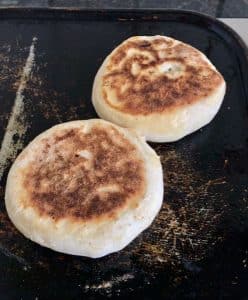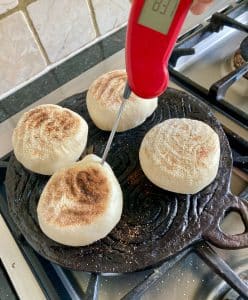Make Bread Muffins, a British Classic
Often the only time we get to eat bread muffins these days is when we have Eggs Benedict. Whilst that is definitely a favourite, we’re really missing out not including this lovely bread for breakfast or brunch.
Eaten fresh or toasted, bread muffins (often referred to as English Muffins) are well worth making.
Gone are the days when the muffin was so popular there was even a song about the “muffin man who lived down Drury Lane” in London. A muffin man was a street seller who bought the muffins from a bakery and sold them direct to households whilst still warm. There seem to have been so many of them that there were complaints about the noise the muffin sellers’ bells’ made leading to prohibition in the 1840s!
Muffins recipes date back hundreds of years. In Hannah Glasse’s recipe published in 1754 she calls for “A bushel of Hertfordshire white flour, a pint and a half of good ale yeast to which is added two gallons of warm water and two ounces of yeast” . It does make you wonder how many she was making at a time as a bushel of flour is approximately 42 lbs (20kg) in weight! A slightly later recipe from Elizabeth Raffald’s book The Experienced English Housekeeper published in 1769 adds milk and egg. This book was so popular there were reputed to be many pirated versions. A little later still, Maira Eliza Rundell in a New System of Domestic Cookery (1806) and Elizabeth Hammond in Modern Domestic Cookery (1817) add butter as well.

These early recipes were all cooked on a baking stone, hearth or griddle rather than baked some baked in rings some not.
A word here about crumpets. Nowadays we think of those items rather waxy in appearance studded with holes. Crumpet recipes are in the main very similar to muffin recipes but are more liquid and poured onto a griddle as you might a scotch pancake. But writers do not agree.
The Bread Chat panel went through a flurry of baking muffins recently so of course I had to join in. I started off with muffins baked on a griddle and was thrilled how they turned out. No rings were required. I also tried baking in the oven in rings. The first time baking in rings, I had insufficient dough to fill them. It will very much depend on the size of ring you have!

Making the Muffins
When baking bread muffins in the oven, a board is placed on top of the muffins after baking for a few minutes to ensure that the top of the muffins remain flat and it is suggested you flip them over.
If you’re baking on a griddle, there’s no need to do this. Which should you choose? I’d suggest trying the griddle muffins – it is so much easier. You’ll also get a slightly lighter crumb as shown in the example below. However, you do need to check that the middle is cooked with a thermometer.
I have an old fashioned griddle or girdle pan. Today’s equivalent would be a cast iron pancake pan which is flat with no ridges. However, a cast iron frying pan is equally good.You can make the dough the night before and then cook for breakfast or brunch the next day. The griddle muffins are so quick to make that they cook in the same time as you cook the rest of your brunch.
Megan Fitzoliver makes bespoke pans called celtic griddles. She kindly let me put one through its paces recently. The pan is rather fun as it transfers the ridged design. to the muffins as you can see.



A digital thermometer is really important so you can tell that the inside is cooked. It needs to get to a minimum of 90C /200F

Bread Muffin Recipe
The muffins are so good for a weekend breakfast. Make the dough the night before and cook in the morning.

Bread Muffins or English Muffins
Equipment
- Griddle or pancake skillet (if baking on the stove)
- Muffin rings / rolled tart rings 10 cm (if baking in the oven)
- 2 baking trays
- Baking parchment or silicon sheet
- Palette knife to turn the muffins on the griddle
- Pastry brush for oiling the griddle
Ingredients
- 300 grams white bread flour
- 210 millilitres milk at room temperature
- 15 grams butter salted or unsalted
- 5 grams salt
- 7 grams Dried Yeast or 10 gr fresh yeast
- Oil for griddle if using
- Semolina or ground rice for dusting
Instructions
- Weigh out the flour and rub in the yeast (if fresh), butter and salt. Add dried yeast if using and mix.
- Add the milk and mix to a stiff dough. Either knead for 10 minutes or use a stand mixer. Dough should ideally be between 24°C and 26°C /78°F
- Leave at room temperature for an hour covered with a lid or tea towel.
- Divide into 90 gr pieces and shape into rounds. Flatten slightly and sprinkle top and bottom with semolina. At this point you can cover with plastic film and put in the fridge overnight. Or allow to prove for 45 minutes.
Cooking on the griddle or in a pan
- Preheat your griddle, pancake pan or frying pan. When heated carefully add a little bit of oil using a pastry brush. Lower the heat to medium or gas to half strength
- Sprinkle a little semolina or extra flour over the muffins
- Depending on the size of your pan you will be able to cook 2 to 4 at a time. Allow to bake for 2 minutes, then turn over.

- Cook for a further 2 minutes and turn again. Continue turning regularly until the internal temperature has reached 95°C and they will be ready for serving.

Cooking in the Oven
- Pre-heat your oven to 200°C.
- Grease the baking rings with butter or cake release spray and place over the muffins.

- Dust the tops of your muffins with a little semolina
- Bake for 8 minutes, take out of the oven and flip over. The easiest way to do this is to put the second baking sheet on top of the first and invert the whole lot. Leave the baking tray on top and bake for a further 5 minutes. Remove tray and bake a further 5 minutes until well coloured and risen. Check internal temperature has reached 95°C

Notes
Find out more
If you want to delve more into the history of English Bread, I highly recommend Elizabeth David’s Book English Bread and Yeast Cookery
Discover my Bake Better Bread series helping you improve your breadmaking






